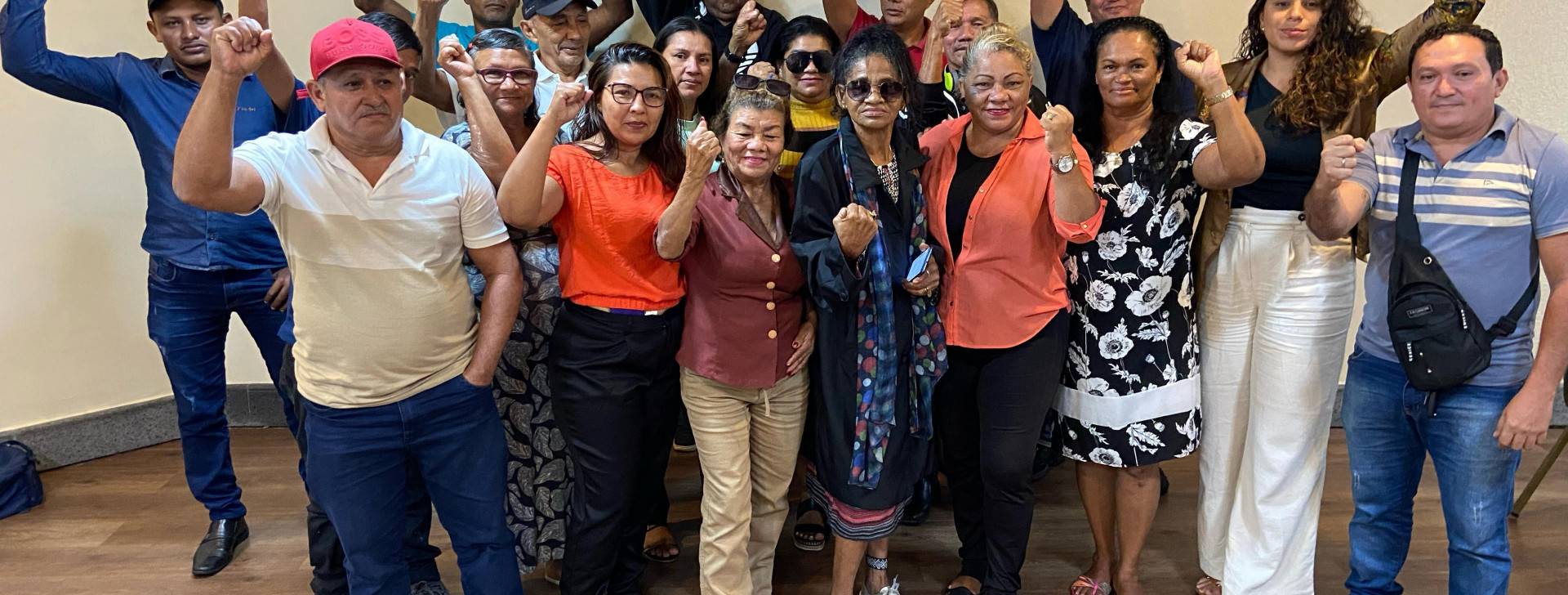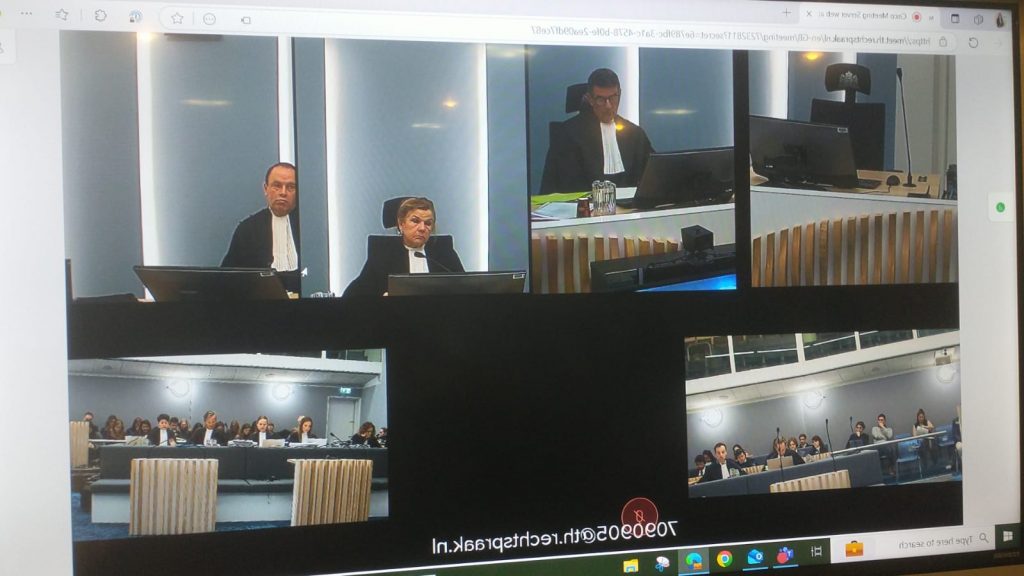Quilombola leader from Pará sees hope in Hydro trial in the Netherlands
18 de March de 2025

By Fabyo Cruz – From Cenarium
BELÉM (PA) – “We hope that justice will be served abroad, in favor of the contaminated, the waters, the river, the animals, the future generation.” This statement comes from Maria do Socorro Costa da Silva, known as Socorro do Burajuba, president of the Association of Caboclos, Indigenous and Quilombolas of the Amazon (Cainquiama), commenting on the trial of the company Norsk Hydro in the Netherlands, which began with a hearing on March 14. The aluminum multinational is facing allegations of environmental and social damages in Barcarena, Pará. The verdict is scheduled for September 24.
The lawsuit, filed in 2021 by Cainquiama and nine residents, accuses Hydro of dumping toxic waste in the region since 2002. In 2018, a spill from the Alunorte refinery contaminated rivers and streams, affecting traditional communities dependent on the water for survival. A report from the Evandro Chagas Institute (IEC) confirmed the presence of heavy metals in the water.
In 2024, the Federal Court sentenced the Norwegian company to pay R$ 100 million due to the environmental disaster in Barcarena. The ruling, which spans 92 pages and was signed by Federal Judge José Airton de Aguiar Portela, imposed a restrictive penalty on the company, prohibiting the world’s largest alumina refinery (outside China) from entering into contracts with public authorities. Additionally, Hydro was barred from receiving subsidies, grants, or donations for ten years, applying this measure to all direct and indirect government entities at every level.
The judge ordered that the R$ 100 million be deposited into the court’s account, “for later allocation to a public or non-profit private institution, provided it is audited by regulatory bodies and/or the Federal Public Prosecutor’s Office, preferably of a socio-environmental nature. This amount may also be directed toward the recovery or establishment of environmental parks, squares, or green leisure spaces in urban areas of the State of Pará, thereby contributing to the improvement of the population’s quality of life, especially in the outskirts of cities.”
The case began in the Barcarena Court in 2012. Seven years later, it was determined that the Federal Court had jurisdiction over the matter, and the lawsuit was assigned to the 9th Court, which handles environmental cases.
Health Impacts
For Socorro do Burajuba, the environmental damage has triggered a public health crisis in Barcarena. “Every day, five, ten people die from cancer. It seems like something is accelerating too fast. In 2009, we had two deaths here, two in four months. Now, when someone goes for a check-up, they already find out they have cancer,” she denounces.

Besides cancer, residents report respiratory problems, memory loss, and neurological complications. “When we wake up here in the quilombo, our voices barely come out. Now, it feels like we’re losing our minds. We don’t just need doctors anymore; we need psychiatrists,” says Socorro.
She also highlights the physical effects of chemical pollution exposure. “Heavy metals are in our bodies. The rainy season causes alumina particles to spread through the air. We feel stomach pain, we struggle to breathe, we catch colds out of nowhere. Our teeth fall out, our eyesight worsens, we suffer from memory loss. Our hair is falling out, and we’re going bald. But we keep fighting,” the quilombola leader told CENARIUM.
Environmental Agreement
In 2018, Norsk Hydro signed a Term of Conduct Adjustment (TAC) with the Federal Public Prosecutor’s Office (MPF), the Pará State Public Prosecutor’s Office (MPPA), and the State Government. The agreement included:
- Assistance to affected communities: Registration of impacted families, provision of potable water, and monthly financial aid of up to one minimum wage.
- Environmental monitoring: Independent audits to assess soil, water, and air, as well as the implementation of systems to analyze beach water quality and air quality.
- Public health: Clinical and laboratory tests to monitor the impact on populations exposed to contamination.
- Infrastructure and safety: Improvements in drainage systems and industrial waste management, along with reinforcements in waste storage facilities.
- Sanctions and fines: Payment of R$ 33.3 million in environmental fines and a financial guarantee of R$ 250 million to ensure compliance with the TAC.
However, Socorro claims that these measures never reached the affected population. “The TAC included an indemnity voucher of one minimum wage for a year, but nothing was fulfilled. There were also supposed to be specialized doctors for us, the contaminated ones, but to this day, there is no medical care. Everything Hydro was sentenced for here is being used politically,” she stated.
Trial in the Netherlands
Given the lack of reparations in Brazil, Cainquiama decided to take the case to the Dutch courts, where Hydro has shareholders. In 2024, the Dutch court recognized the lawsuit’s legitimacy and rejected the company’s argument that the claims were time-barred.
The communities are represented by the Dutch law firm Lemstra Van der Korst (LVdK), in collaboration with the international firm Pogust Goodhead, which specializes in collective litigation and previously led the lawsuit in London against BHP related to the Mariana disaster in Minas Gerais.
The March 2025 hearing was followed via videoconference in Belém. “The judge accepted our lawsuit. Then, she recognized my representation and Cainquiama’s in the case. Now, we are in the third and final hearing,” explains Socorro.

During the trial, Socorro do Burajuba reaffirmed her confidence in international justice. “This is the third and final hearing, and we remain hopeful. The judge has a firm stance and has demonstrated seriousness in handling the case. We believe the Rotterdam Court will do the right thing and that, finally, the affected communities will have their rights recognized,” says the quilombola leader.
What does Hydro say?
In a statement, Hydro “vehemently denied the allegations made by the plaintiffs, based on legal and technical arguments presented in its defense before the Rotterdam Court.” The company argues that “technical reports based on extensive analysis of environmental and health data demonstrate that the plaintiffs’ allegations regarding environmental and community damage are unfounded.”
The statement further claims that “official reports dated 2018, submitted to the Dutch Court, confirm that there was no bauxite residue overflow or damage caused by Alunorte.” It concludes by stating that “the case is expected to proceed with a ruling by the Rotterdam Court at the end of 2025.”

